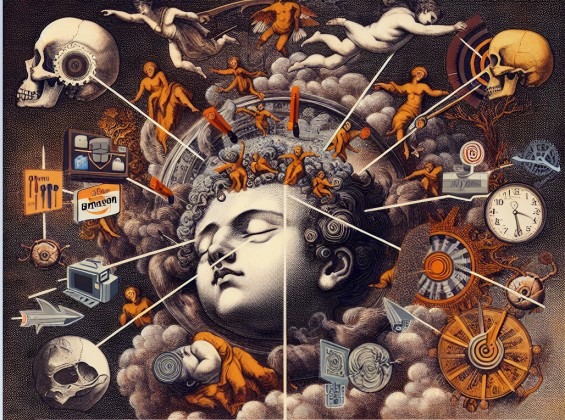
Unmasking the Invisible: The Subtle Art of Brainwashing in Institutions & Media
Updated Feb 11, 2024
Introduction: Intriguing Insights into Brainwashing Techniques in Media
Welcome to the delicately woven tapestry of societal influences, where brainwashing techniques quietly infiltrate our daily lives, moulding our viewpoints and directing our narratives. These subtle manipulations are everywhere – from the financial sector’s carefully crafted ideologies and the education system’s suppression of originality to the political sphere’s clever machinations. The reach and impact of these tactics are far-reaching and undeniable.
These strategies, deploying misinformation, conflicting stories, and deliberate misdirection, sustain a cycle of conformity that chokes the growth of critical thinking. As active participants in this intricate network, we must acknowledge these tactics and question the integrity of the information we encounter.
Education, an institution that first ignites curiosity only to stifle it later, adds another dimension to this complex ballet of influence. The tension between our innate thirst for knowledge and the enforced regimen of standardized tests and rigid structures emphasizes the need to rethink our educational systems radically.
In short, to truly understand the impact of brainwashing techniques, we must maintain a vigilant awareness of the narratives we are fed daily. Only through discernment and dedication to independent thought can we navigate this complex labyrinth, reclaiming the authenticity that forms the heart of true understanding.
Decoding the Invisible: Understanding Brainwashing Techniques in Our Daily Lives
The art of planting seeds of doubt has been perfected by the masters of influence throughout history. If you need a vivid illustration, consider the film “Inception.” The masses have employed this method for centuries with astonishing success, and the trend shows no signs of slowing. Once the seeds are planted, mass media provides the perfect environment for these doubts to flourish and morph into substantial beliefs.
Cloaked in the noble intent of spreading information, media outlets aim to subtly shape our thinking. Misdirection is a common tactic, often blowing minor issues out of proportion to divert the public’s attention. Regrettably, this method proves to be incredibly effective. The most potent brainwashing institutions today are arguably public schools and mass media.
Unveiling the Hidden: Brainwashing Techniques in the Financial Sector
In finance, a particularly cunning technique stands out—it thrives on the strategic use of brainwashing. Professionals in the industry frequently voice contradictory opinions, creating a two-fold strategy. First, they bombard you with an avalanche of information to overwhelm and blur the specifics in your mind. Then, they present both sides of the argument, ensuring they can conveniently align with the eventual outcome, maintaining their supposed foresight.
Despite their projected certainty, it’s vital to understand that these experts, too, are making educated guesses, not unlike the rest of us. The significant difference is their leverage over the media, casting the public as passive spectators, unknowingly embarking on a journey driven by these financial puppeteers.
Now, let’s draw wisdom from three influential historical figures known for their profound insights on investing and life.
Warren Buffet, a renowned investor, once said, “Be fearful when others are greedy and greedy when others are fearful.” This quote rings true in the context of media manipulation. When the masses are often driven towards a particular trend, it’s a sign of a potential bubble, and it may be wise to be sceptical.
Robert Kiyosaki, the author of “Rich Dad Poor Dad,” emphasized the importance of financial education. With the financial sector often clouded by manipulative tactics, arming ourselves with knowledge and a critical mindset is our best defence.
Lastly, Benjamin Franklin’s timeless wisdom, “Believe none of what you hear and only half of what you see,” urges us to question the information we receive, especially in today’s era of misinformation and media manipulation.
The Curiosity Conundrum: Does Public Education Stifle or Ignite?
Curiosity, the intense desire to explore new, challenging, and uncertain events, is a powerful force that shapes our lives. It’s linked to happiness, creativity, meaningful relationships, personal growth after trauma, and increased life satisfaction. In education, a “hungry mind” is seen as a critical determinant of academic success, rivalling even the predictive power of IQ. But does our public education system nurture this vital trait, or does it inadvertently suppress it?
The role of curiosity in human development and achievement is undeniable. From the invention of fire to the development of self-driving cars, curiosity has driven our most significant discoveries and innovations. It’s a fundamental human attribute that prompts us to seek new information, experiences, and possibilities. In business, fostering curiosity at all levels helps leaders and their employees adapt to uncertain market conditions and external pressures. When our curiosity is piqued, we think more deeply and rationally about decisions and develop creative solutions.
However, in the context of our schools, curiosity often seems underappreciated. Amidst the frenzy of standardized testing, schools may overlook what truly matters about learning: the desire to know in the first place. This tension between the natural desire to understand and the artificial imposition of standardized testing and rigid structures underscores the need for a fundamental reevaluation of educational paradigms.
Let’s consider the wisdom of three influential figures known for their profound insights on education and life.
Albert Einstein, one of the greatest minds in history, once said, “I have no special talent. I am only passionately curious.” This quote underscores the importance of curiosity as a driving force for learning and discovery.
Sir Ken Robinson, a renowned education and creativity expert, argued that “curiosity is the engine of achievement.” His work emphasizes fostering curiosity in our classrooms to drive learning and achievement.
Finally, philosopher and psychologist William James highlighted curiosity as the “impulse towards better cognition.” He noted that curiosity drives children towards objects of novelty, which later evolves into a higher, more intellectual form—an impulse towards more complete scientific and philosophical knowledge.
In schools, curiosity is significantly undervalued.
An unfortunate reality in our schools today is the gross underestimation of the value of curiosity. In her insightful book, “The Hungry Mind,” Susan Engel discusses the overlooked importance of cultivating the innate desire to learn amidst the tumult of standardized testing obsessions. She notes that these traits are seldom nurtured in the classroom despite our inherent abundance of interest and natural inclination towards exploration.
Ironically (and curiously), even in gifted and talented education, curiosity is noticeably absent. This paradox is perplexing, considering the vital role of curiosity in fostering intellectual growth and academic success.
Yet, the current school systems often operate on a more ominous level, subtly employing brainwashing techniques. Under the guise of providing a standardized education, schools may unintentionally suppress students’ curiosity and constrain their thinking within predetermined structures. This practice subtly shapes young minds to conform to societal norms and expectations, overshadowing their natural penchant for questioning and discovery.
To delve deeper into this issue, let’s draw upon the wisdom of three influential figures known for their profound insights into education and life.
A celebrated philosopher and poet, Ralph Waldo Emerson, once said, “The secret of education lies in respecting the pupil.” This quote underlines the importance of recognizing each student’s individuality and nurturing their innate curiosity.
Maria Montessori, a pioneer in education, believed, “One test of the correctness of educational procedure is the happiness of the child.” Her philosophy encourages an education system that fosters joy and curiosity in learning rather than rigid conformity.
Lastly, George Orwell, known for his insightful exploration of societal influences, warned, “Every generation imagines itself to be more intelligent than the one that went before it, and wiser than the one that comes after it.” This cautionary note serves as a reminder to question the status quo and to continually strive for an educational system that nurtures curiosity and independent thought.
State-Mandated Education & Brainwashing Techniques
Plato
Knowledge that is acquired under compulsion obtains no hold on the mind.
Chuang Tzu
Reward and punishment is the lowest form of education.
Mark Twain
I have never let my schooling interfere with my education.
Soap and education are not as sudden as a massacre, but they are more deadly in the long run.
Education consists mainly in what we have unlearned.
In the first place, God made idiots. This was for practice. Then he made school boards.
Oscar Wilde
The whole theory of modern education is radically unsound. Fortunately, in England, at any rate, education produces no effect whatsoever. If it did, it would prove a serious danger to the upper classes and probably lead to acts of violence.
Education is an admirable thing, but it is well to remember from time to time that nothing that is worth knowing can be taught.
Everyone who is incapable of learning has taken to teaching.
Winston Churchill
How I wouldn’t say I liked schools, and what a life of anxiety I lived there. I counted the hours to the end of every term when I should return home.
I always like to learn, but I don’t always like to be taught.
George Bernard Shaw
There is nothing on earth intended for innocent people so horrible as a school.
What we call education and culture is, for the most part, nothing but the substitution of reading for experience, of literature for life, of the obsolete fictitious for the contemporary real.
Bertrand Russell
Men are born ignorant, not stupid; they are made stupid by education.
Education is one of the chief obstacles to intelligence and freedom of thought.
Benjamin Franklin
He was so learned that he could name a horse in nine languages, so ignorant that he bought a cow to ride on.
Thomas Edison
I remember that I was never able to get along at school. I was at the foot of the class.
Henry David Thoreau
What does education often do? It makes a straight-cut ditch of a free, meandering brook.
How could youths better learn to live than by at once trying the experiment of living?
H. L. Mencken
The average schoolmaster is and always must be essentially an ass, for how can one imagine an intelligent man engaging in so puerile an avocation.
George Saville, Marquis of Halifax
The vanity of teaching doth oft tempt a man to forget that he is a blockhead..
Norman Douglas
Education is a state-controlled manufactory of echoes.
Paul Karl Feyerabend
The best education consists in immunizing people against systematic attempts at education.
Theodore Roosevelt
A man who has never gone to school may steal from a freight car, but if he has a university education, he may steal the whole railroad.
Robert Frost
Education is hanging around until you’ve caught on.
Ralph Waldo Emerson
I pay the schoolmaster, but the schoolboys educate my son.
William Hazlitt
Anyone who has passed through the regular gradations of a classical education and is not made a fool by it, may consider himself as having had a very narrow escape.
Laurence J. Peter
Education is a method whereby one acquires a higher grade of prejudices.
Anne Sullivan (I bow to her.)
I am beginning to suspect all elaborate and unique systems of education. They seem to me to be built up on the supposition that every child is a kind of idiot who must be taught to think.
Alice Duer Miller
In education, it’s a common pitfall to inadvertently sever the living root of curiosity only to attempt to compensate for its absence with artificial measures. This paradoxical approach involves suppressing a child’s natural curiosity and offering specialised coaching to address academic challenges in response to their waning interest in learning. The question arises: Are we nurturing genuine curiosity or inadvertently impeding the very essence of natural education?
Florence King
Showing up at school already able to read is like showing up at the undertaker’s already embalmed: people start worrying about being put out of their jobs.
Emma Goldman
Since every effort in our educational life seems to be directed toward making the child a being foreign to itself, it must of necessity, produce individuals foreign to one another and in everlasting antagonism with each other.
Edward M. Forster
Spoon feeding, in the long run, teaches us nothing but the shape of the spoon.
Elbert Hubbard
You can lead a boy to college, but you cannot make him think.
Max Leon Forman
Education seems to be, in America, the only commodity of which the customer tries to get as little as he can for his money.
Phillip K. Dick
The trouble with being educated is that it takes a long time; it uses up the better part of your life and when you are finished, what you know is that you would have benefited more by going into banking.
William John Bennett
If [our schools] are still bad maybe we should declare educational bankruptcy, give the people their money and let them educate themselves and start their own schools.
John Updike
School is where you go between when your parents can’t take you, and industry can’t take you.
Robert Buzzell
The mark of a true MBA is that he is often wrong but seldom in doubt.
Robert M. Hutchins
The three major administrative problems on a campus are sex for the students, athletics for the alumni, and parking for the faculty.
The college graduate is presented with a sheepskin to cover his intellectual nakedness.
Beyond IQ: A New Understanding of Intelligence
A revolutionary study has begun to challenge the long-standing belief in the effectiveness of IQ tests as the sole measure of intelligence. Roger Highfield, co-author of the study and director of external affairs at the Science Museum in London, argues that a single measure like IQ cannot fully encapsulate a person’s cognitive abilities. The research identifies three distinct brain circuits contributing to intelligence: short-term memory, reasoning, and verbal skills.
Published in the journal Neuron, the study’s findings debunk the idea that a one-dimensional intelligence assessment can capture the diverse range of cognitive abilities seen in individuals. Dr. Highfield emphasizes the limitations of relying solely on IQ as a comprehensive measure, citing instances of individuals excelling in one area while lacking in others.
This research challenges a century-old paradigm that sought to categorize people based on a single number representing general intelligence. The conclusion highlights the complexity of cognitive ability, emphasizing the need to recognize and measure its multifaceted nature.
Let’s consider the wisdom of three influential figures known for their profound insights on intelligence and life.
Albert Einstein, one of the greatest minds in history, once said, “The true sign of intelligence is not knowledge but imagination.” This quote underscores the importance of creativity and innovative thinking, aspects not typically measured by IQ tests.
Howard Gardner, a renowned psychologist and education researcher, proposed the theory of multiple intelligences. He argued that traditional IQ tests fail to measure the full range of human intelligence, emphasizing the need to consider diverse cognitive abilities.
Lastly, a prominent psychologist, Robert Sternberg proposed the Triarchic Theory of Intelligence, which includes analytical, creative, and practical intelligence. His work highlights the limitations of IQ tests and the need for a more comprehensive understanding of intelligence.
Unshackling Minds: Rethinking Education for the Modern Era
Our educational institutions, rooted in the industrial age, were designed to produce a workforce for 19th-century factories, emphasizing compliance and repetitive tasks. However, this outdated model stifles collaboration and critical thinking, proving counterproductive in today’s dynamic world.
The skills taught in schools are obsolete and detrimental to children’s development. The rigid system, initially aimed at maintaining order, now causes stress due to strict rule enforcement. Notably, roles like “detention director” prioritize discipline over fostering creativity.
In essence, our schools risk moulding students into mindless conformists within a dehumanizing system that no longer serves their best interests.
Decoding the Impact of Brainwashing: A Tactical Investor’s Perspective
Children typically start life with a clean slate, grounded in the proper premises. However, as they grow into adults, external influences often lead them astray, setting them on the wrong course. Individuals then spend a lifetime searching for solutions without realizing that the premise itself is flawed, rendering any answer elusive.
In this context, conversations with children are significantly more captivating than those with most adults. Why? Simply put, children speak their minds without contamination before societal influences take hold. Engaging with a child eliminates the need for defences because you can count on them to express unfiltered thoughts. It’s a refreshing contrast to the diplomatic conversations commonly found in adulthood.
You might wonder why this matters. The answer lies in the authenticity of communication. Unburdened by societal norms, children provide a glimpse into straightforward and honest dialogue. Many individuals crave such authenticity but are hesitant due to societal conditioning that discourages it. This reluctance to speak openly may explain, in part, the unexpected success of figures like Trump, who defied traditional norms.
The journey from childhood strength to adult mental challenges is a perplexing transformation. Ideally, governments should serve the interests of their people, yet, more often than not, they prioritize their own needs, giving only a passing acknowledgement to the concerns of their citizens. Across nations, it’s evident that governmental agendas seldom align with the genuine desires of the people they are meant to represent.
Conclusion: Brainwashing Techniques
In the intricate web of societal influences, it becomes evident that brainwashing techniques infiltrate various aspects of our lives, subtly shaping perspectives and steering narratives. Whether observed in the financial sector’s orchestrated opinions, the education system’s stifling of creativity, or the political arena’s manipulation, the impact of these techniques is undeniable.
The tactical deployment of misinformation, conflicting narratives, and misdirection perpetuates a cycle of conformity, hindering the development of critical thinking. As we navigate this complex landscape, it’s crucial to recognize these influences’ orchestrated nature and question the information’s authenticity.
The paradox of education, where curiosity is initially kindled but later suppressed, adds another layer to the intricate dance of influence. The dichotomy between the natural desire to learn and the artificial imposition of standardized testing and rigid structures underscores the need for a fundamental reevaluation of educational paradigms.
In essence, decoding the impact of brainwashing techniques requires a vigilant awareness of the narratives we encounter daily. We hope to navigate this intricate maze and reclaim the authenticity that lies at the core of genuine understanding only through discernment and a commitment to independent thinking.
Originally published on March 25, 2019, and last updated on February 11, 2024.
Unveil the Hidden Gems: Explore More

Savor the Flavors of Serbia: Exploring the Delights of Serbian Food

Living Beyond Your Means: Financial Folly Unveiled

The Myth of the Jewish Genome Unveiled

Unraveling Long and Variable Lags in the Stock Market

Vulgar Words: A Psychological Perspective

Record Corporate Debt Garners Attention: A Concerning Development

Mastering Investment: Overcome Herd Mentality Bias

Impact of AI on Human Workforce: Navigating Change

CNQ Stock: Igniting Potential with an Exciting Market Pattern

What Is A Strong Currency: Its and Impact on Economic Stability

Why Is Student Debt A Problem? Simple Fixes

American Power and Gas: Revolutionizing the Energy Sector

Americans favor coffee to stock market investing

The Rich Get Richer The Poor Get Poorer: Socioeconomic Inequality
Overcoming Crowd Phobia: Understanding the Fear of Large Crowds


